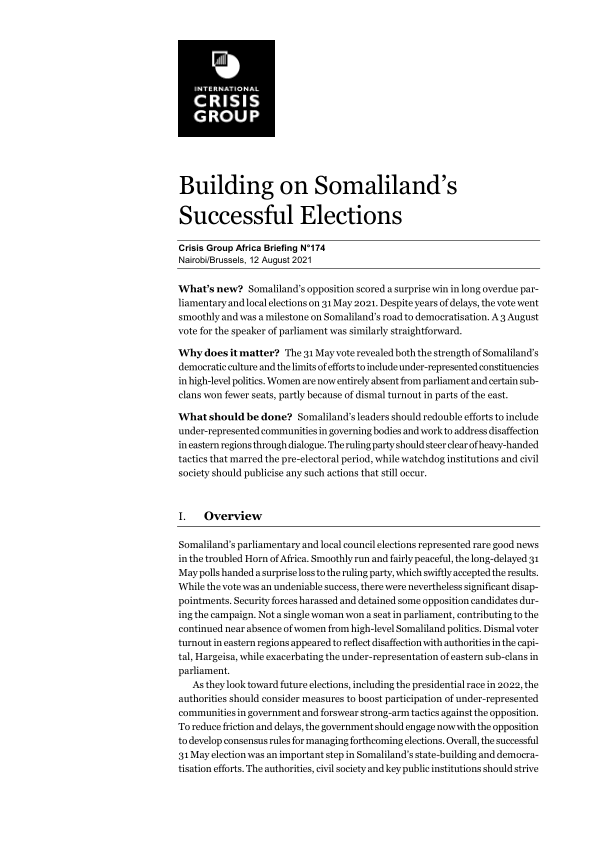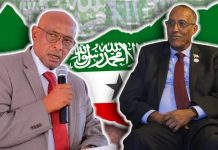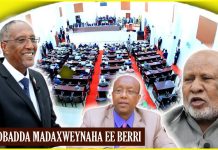Informing humanitarians worldwide 24/7 — a service provided by UN OCHA <!– TEMPORARY – COVID-19 – disabled – 2022/03/31 RW COVID-19 page: Find latest updates on global humanitarian responses –>
Find help on how to use the site, read terms and conditions, view the FAQs and API documentation.
Access your account or create a new one for additional features or to post job or training opportunities.
Latest humanitarian reports, maps and infographics and full document archive.
List of countries covered by ReliefWeb.
List of alerts, ongoing and past disasters covered by ReliefWeb.
List of organizations that are actively providing ReliefWeb with content.
Curated pages dedicated to humanitarian themes and specific humanitarian crises.
Open job opportunities in the humanitarian field.
Open training opportunities in the humanitarian field.
Somalia
Somaliland took an important step toward stable democracy with parliamentary and local council polls on 31 May. To keep moving in this direction, authorities and the opposition should build consensus on how to run future voting and how to make the government more inclusive.
What’s new? Somaliland’s opposition scored a surprise win in long overdue parliamentary and local elections on 31 May 2021. Despite years of delays, the vote went smoothly and was a milestone on Somaliland’s road to democratisation. A 3 August vote for the speaker of parliament was similarly straightforward.
Why does it matter? The 31 May vote revealed both the strength of Somaliland’s democratic culture and the limits of efforts to include under-represented constituencies in high-level politics. Women are now entirely absent from parliament and certain sub-clans won fewer seats, partly because of dismal turnout in parts of the east.
What should be done? Somaliland’s leaders should redouble efforts to include under-represented communities in governing bodies and work to address disaffection in eastern regions through dialogue. The ruling party should steer clear of heavy-handed tactics that marred the pre-electoral period, while watchdog institutions and civil society should publicise any such actions that still occur.
I.Overview
Somaliland’s parliamentary and local council elections represented rare good news in the troubled Horn of Africa. Smoothly run and fairly peaceful, the long-delayed 31 May polls handed a surprise loss to the ruling party, which swiftly accepted the results. While the vote was an undeniable success, there were nevertheless significant disappointments. Security forces harassed and detained some opposition candidates during the campaign. Not a single woman won a seat in parliament, contributing to the continued near absence of women from high-level Somaliland politics. Dismal voter turnout in eastern regions appeared to reflect disaffection with authorities in the capital, Hargeisa, while exacerbating the under-representation of eastern sub-clans in parliament.
As they look toward future elections, including the presidential race in 2022, the authorities should consider measures to boost participation of under-represented communities in government and forswear strong-arm tactics against the opposition. To reduce friction and delays, the government should engage now with the opposition to develop consensus rules for managing forthcoming elections. Overall, the successful 31 May election was an important step in Somaliland’s state-building and democratisation efforts. The authorities, civil society and key public institutions should strive to consolidate these gains and build broad political agreement on how to make continued progress toward stable, peaceful and inclusive democracy in Somaliland.
Somalia
Somalia
Somalia
Somalia
ReliefWeb's blog
ReliefWeb Labs projects explore new and emerging opportunities to improve information delivery to humanitarians.
Learn more about ReliefWeb, leading online source for reliable and timely humanitarian information on global crises and disasters since 1996.
ReliefWeb's terms & Conditions.
Contact us.
Service provided by UN OCHA
OCHA coordinates the global emergency response to save lives and protect people in humanitarian crises. We advocate for effective and principled humanitarian action by all, for all.
ReliefWeb's Terms & Conditions.
© 2022 all rights reserved.






















